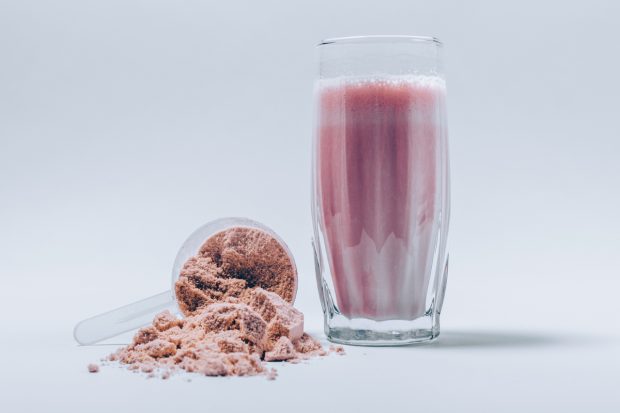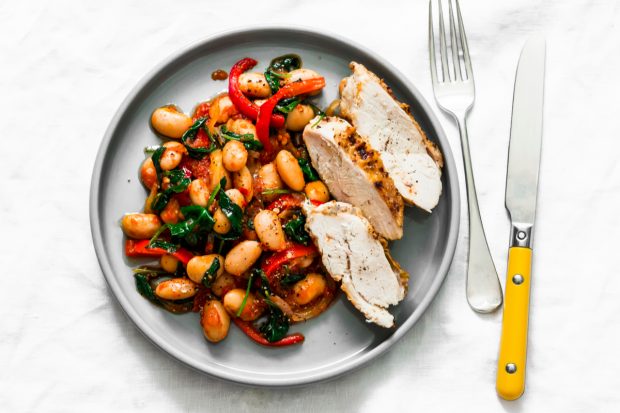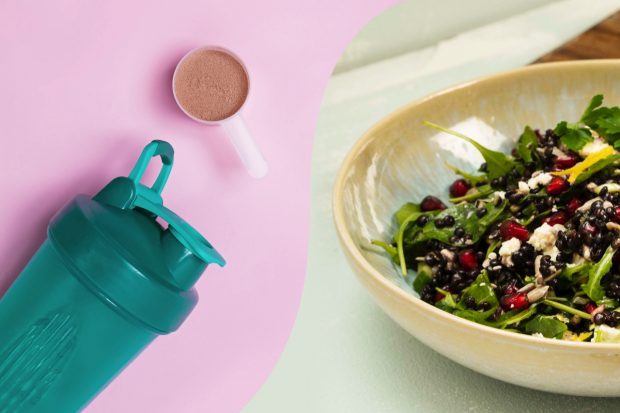Get the inside scoop on protein powder.

To scoop or not to scoop, that is the question. There are many reasons why protein powder is so popular. Whether you think it’ll get you more swole or you simply use it as a post-workout supplement, you need to know the cold hard facts. After all, not all protein supplements are created equal.
While there’s no question that protein is important for your body—it builds and repairs muscle tissues and cells—you must ask yourself this, ‘Do I really need a supplement?’
So before shelving out hundreds of dollars on something you may not need, let’s find out how necessary protein powder actually is for you and your fitness goals.
The Inside Scoop on Protein Powder

Supplements are created by extracting protein from animal or plant-based sources like cow’s milk, eggs, peas, rice, soy and whey.
Protein powders are often stripped of carbohydrates, fats, minerals and fiber and replaced with unnatural ingredients, other nutrients, herbs or even added sugar and sweeteners.
Related: The Hard Truth Behind Supplements
It’s important to note that protein powders aren’t regulated in the same way as food or medicine. In fact, many companies manufacturing protein supplements aren’t properly testing for safety or efficacy before their products hit the shelves.
Each year, roughly 25 percent of protein supplement manufacturers receive citations from the Food and Drug Administration related to falsifying the purity, strength and ingredient content of their products.
How Much Protein Do You Actually Need?

When I was playing college basketball, I thought protein supplements were the answer to elevating my game. Because of this belief, I consumed at least 3 protein shakes a day—one in the morning for breakfast, one after basketball practice and another one with my evening meal.
Over time, I developed kidney stones, which is caused by consuming too much protein. Let’s just say that after this extremely painful health threat, I never touched a protein shake again!
So, if you’re downing protein shakes on the reg, you’re probably thinking it’ll improve your performance or that you’re not getting enough from your diet. But how much do you actually need?
While the amount of protein you need is based on several factors—age, gender, health and activity level—the Institute of Medicine recommends 0.8 grams of protein per kilogram of body weight per day (that’s approximately 0.36 grams per pound).
That means a 140-pound person needs roughly 50 grams of protein per day, while a 180-pound person should shoot for around 65 grams of protein per day.
If you have no idea how much protein you’re intaking on a daily basis, here are a few examples of the amounts of protein you can find in common foods: a 4-ounce steak contains 28 grams of protein, 2 large boiled eggs contains 12.6 grams of protein and a cup of yogurt has 10 grams of protein.
Pro tip: Read the ingredient label to find out how many grams of protein are actually in the foods you love.
But How Much Protein Do You Need If You’re Trying to Build Muscle?

What’s the first thing that comes to mind when you think of protein supplements? Most people think drinking protein shakes will help them add muscle to their frame. And in most cases, if that’s your goal, additional protein supplements are beneficial. But it really boils down to how active you are.
According to the American College of Sports Medicine (ACSM), the optimal daily protein intake for active adults and athletes is 1.2 to 2 grams per kilogram of body weight (0.5 to 0.9 grams of protein per pound).
This means a 140-pound active adult should intake anywhere from 70 to 126 grams of protein per day and a 180-pound active adult should consume between 90 and 162 grams of protein per day.
It’s important to note that this high intake of protein is only recommended for those of you partaking in very intense and long workouts, where muscle repair and regrowth are needed to recover more quickly between strenuous training sessions.
And yeah, that’s a ton of protein. While it’s not impossible to get these amounts through diet alone, protein supplements might be the easiest choice here.
Are There Risks Associated With Consuming Too Much Protein?

Hell yeah, there are! High-protein diets are associated with several risks, including weight gain, bad breath, constipation, diarrhea, dehydration, kidney damage, cancer and heart disease.
Related: The Real Truth on Protein, Carbs and Fat
Just like carbs and fat, excess protein consumption is stored as fat, which leads to weight gain. In fact, studies have found that weight gain is significantly higher in diets where protein replaced carbohydrates.
Eating large amounts of protein can also lead to bad breath, especially if you restrict your carbohydrate intake. This is because your body goes into a metabolic state called ketosis, which produces chemicals that give off an unpleasant smell.
Additionally, when you’re consuming too much protein, your kidneys work much harder to get rid of the extra nitrogen and waste products of protein metabolism. This can lead to kidney damage.
Studies have also shown that high-protein diets are linked to an increased risk of cancer. Researchers believe this is due to the hormones, carcinogenic compounds and fats found in meat.
Should I Get Protein From Powders or Food?

Protein powders are certainly convenient but they’re by no means necessary.
You must first determine whether your goal is to gain muscle mass or supplement your diet if you’re not getting enough protein in your day-to-day life.
Overconsumption of protein is stored as fat, contributes to weight gain and may actually reduce your muscle-building potential. Overdoing it on the protein powder is unlikely to be helpful.
If you’re a healthy adult, chances are you can adjust your food intake to meet your recommended daily allowance. Plus, foods containing protein are often much cheaper and less risky than supplements.
But if you’re still keen on taking a supplement, opt for plant-based protein powders since they have a much quicker absorption rate than animal-based products. Opt for rice and pea protein, since both have been shown to stimulate muscle growth similar to whey, a milk-based protein supplement.
The Bottom Line
It’s important that you take the risks into consideration before investing in protein powders that may or may not be necessary.
Above all, it’s vital to eat a healthy, balanced diet and engage in an active lifestyle. Align your plan for achieving your health and wellness goals in a way that makes sense to you.
Hit your protein target and build muscle and strength with Gymondo’s all-access pass to 1000+ healthy recipes and 500+ inspiring workouts. Start your free trial today.







